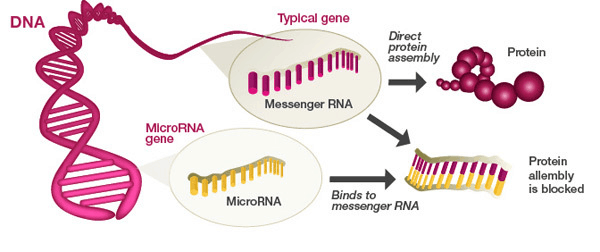Research Applications of MicroRNA Agomir/Antagomir
Since its discovery in 1993, microRNA (miRNA) has proven its value in biotechnological research many times over. MicroRNA is a small (approximately 22 nucleotides), endogenous, non-coding RNA molecule that occurs in animals, plants, and certain viruses. These molecules have been found to play a hugely important role in the regulation of gene expression after transcription, and well over one thousand miRNAs can be found in the human genome. They are believed to influence at least 30 percent of human genes.

MiRNA inhibitors and mimics promote RNA silencing by cleaving the messenger RNA (mRNA) strand into separate pieces, destabilizing the mRNA via shortening of the poly(A) tail, and/or interfering with the translation of mRNA into proteins.
MiRNA agomir/antagomir synthetic molecules provide biotech researchers with a powerful tool for their investigations.
About Agomir
Advantages of MicroRNA Agomir/Antagomir
Owning to its vast importance in gene regulatory networks, miRNA offers enormous potential to researchers involved in the investigation of cellular processes such as proliferation, differentiation, and apoptosis. MiRNA research promises to produce breakthroughs in the treatment of cancer, diabetes, heart disease, and other disorders.
Agomir/antagomir synthesis services are available to biotech professionals who need these molecules for research purposes. Their best option is to obtain these services from a reputable biotechnological company like AcceGen. AcceGen’s agomir/antagomir synthesis services provide a number of important benefits to researchers:
Easy to inject– AcceGen’s agomir and antagomir can be introduced into an animal via local or intravenous injection.
Ready for transfection– These MiRNA mimics and inhibitors will arrive purified.
Comprehensiveness– AcceGen’s agomir/antagomir synthesis services includes all the human, mouse, & rat miRNAs listed on the microRNA database miRBase (mirbase.org).
High stability– AcceGen’s agomir and antagomir can easily pass through cell membranes.
Cost-effectiveness – Short synthesis cycles reduce costs.
AcceGen’s MicroRNA agomir/antagomir database is online and open to the public. More than 5,000 human (hsa-miR-), mouse (mmu-miR-), and rat (rno-miR-) agomir/antagomir miRNAs are ready for shipping worldwide.

Comments
Post a Comment